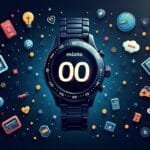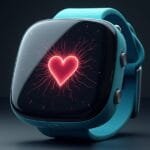Smart Wearable Tech Revolutionizing Health Monitoring with Advanced Heart Rate and Stress Tracking Technologies for Optimal Wellness and Daily Balance in 2025.
Will Your Next Workout Be Controlled by Your Heart Rate? As we strive for optimal wellness and daily balance in 2025, the best wearables for sports fitness goals are revolutionizing health monitoring with advanced heart rate tracking technologies. In this article, we’ll compare top products to help you achieve your fitness objectives, from stress tracking to real-time performance analysis.
Introduction to Advanced Heart Rate Monitoring
The world of wearable technology has evolved significantly over the years, and one area that has seen tremendous growth is heart rate monitoring. From basic pulse monitors to advanced ECG-based devices, smart wearables are now capable of providing real-time feedback on your physical condition.
How Heart Rate Monitoring Works
At its core, heart rate monitoring involves tracking the beats per minute (BPM) of an individual’s heart. This can be achieved using various techniques, including:
- Electrocardiogram (ECG) technology: Measures electrical signals produced by the heart.
- Photoplethysmography (PPG): Uses light to detect changes in blood flow and oxygen saturation.
- Accelerometry: Tracks movement patterns, including frequency and intensity of physical activity.
Each method has its strengths and limitations, with ECG-based devices offering the most accurate measurements but often requiring contact or a chest strap. PPG technology is non-invasive and convenient but may not provide as precise readings. Accelerometry provides valuable insights into movement patterns but can be affected by external factors like weather conditions.
Top Wearable Devices for Advanced Heart Rate Monitoring
Here are some of the top wearable devices that offer advanced heart rate monitoring features:
| Device | Heart Rate Tracking Method | Additional Features |
|---|---|---|
| Apple Watch Series 7 | ECG and PPG technology | EKG app, irregular rhythm detection, fitness tracking, music storage |
| Fitbit Sense | ECG and PPG technology | Electrodermal activity (EDA) monitoring, sleep stage tracking, guided breathing sessions |
| Garmin Forerunner 945 | Accelerometry and GPS data integration | GPS navigation, music storage, advanced performance metrics, stress tracking |
| Oura Ring | PPG technology | Resting heart rate monitoring, sleep quality analysis, recovery tracking |
Stress Tracking: A Key Component of Optimal Wellness
Wearable devices can now track stress levels through various methods, including:
- Electrodermal activity (EDA) monitoring: Measures skin conductance to determine stress levels.
- Heart rate variability (HRV): Analyzes changes in heart rate intervals to assess parasympathetic and sympathetic nervous system activity.
- Physiological signals: Monitors body temperature, blood pressure, and other physiological markers for signs of stress.
Some wearables also offer guided breathing sessions or meditation exercises to help users manage stress and anxiety. For instance:
- Fitbit Sense offers personalized relaxation recommendations based on user data.
- The Oura Ring provides detailed sleep quality analysis, helping users identify potential causes of stress.
Real-Time Performance Analysis: Unlocking Your Full Potential
Smart wearables can provide real-time performance metrics, enabling athletes to fine-tune their training regimens and achieve better results. Some features include:
- Heart rate monitoring during exercise or physical activity.
- Real-time pace tracking for runners or cyclists.
- Energy expenditure calculations to help users optimize fuel intake.
For example, the Garmin Forerunner 945 offers advanced performance metrics like:
- Training load analysis to prevent overtraining and injury.
- Pace prediction for athletes competing in endurance events.
Choosing the Best Wearable Device for Your Fitness Goals
When selecting a wearable device, consider your specific needs and preferences. Ask yourself:
- What type of activities do I engage in most often? (e.g., running, swimming, yoga)
- Do I prefer ECG or PPG heart rate monitoring?
- Are stress tracking features important to me?
- Do I need real-time performance analysis for my training regimen?
Based on your answers, you can narrow down the options and select a wearable device that best suits your fitness objectives.
Additional Sources of Information:
Recommended Reading:
- The American Heart Association’s (AHA) article on heart rate monitoring for athletes: https://www.heart.org/en/healthy-living/fitness/get-moving/athletes-and-heart-rate-monitoring
- The National Sleep Foundation’s (NSF) guide to sleep and heart rate monitoring: https://www.sleepfoundation.org/articles/sleep-and-heart-rate-monitoring
- Fitbit’s blog post on stress tracking with the Fitbit Sense: https://blog.fitbit.com/stress-tracking-with-fitbit-sense/
These resources provide valuable insights into heart rate monitoring, sleep analysis, and stress tracking. By exploring these topics further, you can gain a deeper understanding of how wearable devices can support your journey towards optimal wellness.
Explore more in our category page or visit our homepage.



